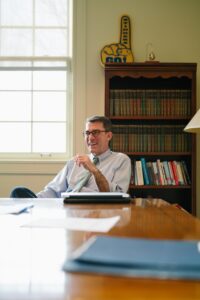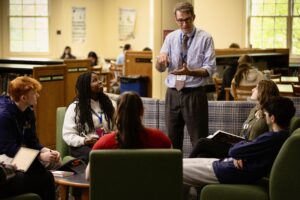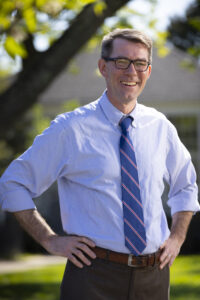Matt Bolton

I remember the moment I went from thinking, I’m glad I’m looking into the Head of Upper position at Seven Hills, to thinking, This is the one! I’ve got to land this job. It was when, in the course of interviewing, I sat down for lunch with some of the students, who were just fantastic. It was a random cross-section of kids from the Upper School, probably grabbed by Barb Hepp while they were walking into the building that morning. I was so struck by their maturity, how they interacted with each other, their comfort in talking to a grown-up they didn’t know about grown-up stuff. I came out of that lunch thinking, This is the place for me! and fortunately was hired just before Thanksgiving in 2013.
I spent the summer of 2014 having coffee with different faculty members before starting in my new role, and the next thing that struck me about the school is how many different examples of leadership there are from within the faculty. There are all of these teachers who don’t have a title or an office that says they’re in charge of this or that, and yet, I met one person after another who’d taken some area of school life that we think is important and led the charge on it — Anne Ramsay and Barbara VanderLaan, for example, with community service. On paper, it said Anne and Barbara were listed as math teachers, but they were also two driving forces behind our service program and in focusing the students on people less fortunate than us.

When I started as Head of Upper in 2014, I also taught ninth grade English. I’ll always remember my first class of students, which included Mary Grace Ramsay, Seth Friedman, Bret Miller, all of these outgoing, smart, funny ninth graders, and we’d dive deep into the syllabus but also into talking about movies and pop culture. It was a year of collectively cracking each other up in class and having a great time, and it’s a group, almost 10 years later, that I’ve stayed in touch with. I’ve joked that the iconic history teacher Lowell Wenger — who made the schedule — thought I didn’t know what I was doing, so he did me the favor of intentionally putting me with these superstar kids. But you come to learn that at Seven Hills, a random cross-section of ninth graders are superstars.
I love the way the kids celebrate each other’s successes and find joy and pride in what they accomplish in a lot of different areas rather than feeling like it’s a zero-sum game and if someone else wins, that means they’ve lost.
Seven Hills is a place where you don’t get pigeonholed and narrowly defined. I love when I’m attending a school concert in the evening and halfway through, a few kids come on stage in their softball uniforms because it was important that they play in the softball championship and also important to them that they’re in the concert.

Our older kids are so often role models and leaders and champions of the younger kids. It might sound like a silly example, but I think about the Turkey Tango during our annual Thanksgiving ceremony, where the seniors and the Lotspeich kids are dancing this dance together, coming full circle from when some of them were in elementary school dancing with the seniors.
I believe the hardest thing to move is culture, and we have this incredibly warm, supportive culture. And there’s something self-replicating about it. As kids come through, that’s what they adopt, rather than, say, a really competitive cutthroat culture. Kids are challenging themselves, but they don’t measure themselves by asking, Did I get ahead of this person in the next seat? It’s more, did they do their best. And really, they’re lifted up by the successes of their peers.
We are able to innovate here in a way that not every school is. We have a really strong culture, but we’re not hidebound by long-standing traditions, or by saying “This is our way of doing things, and we can’t ever move beyond that.” I think some of the biggest innovation is seen in the academic paths that students can now take through the Upper School. If an individual student decides they want to learn Ancient Greek or sign language or do work in a lab that goes beyond the scope of their studies, there always seems to be a teacher who says, “Yeah, I can do that — we’ll set things up and run with it.”

Increasing the size of the student body, as we’ve done, has also opened up possibilities that just weren’t possible when the Upper School was a section or two smaller. For kids who love the STEM side of the program, or the languages, or the arts, you just can’t exhaust all of our offerings. Your four years are up before you can get through it all. The Chinese program is a great example — without increasing the student body, I don’t think we could have opened up a fourth language without decimating one of the existing ones.
Because of these offerings, which are on top of the core curriculum, we have kids coming back from college saying, “I was really prepared!” Our students tell us things like, “I’m a BioMed major, and I had time in the lab that kids in other high school programs weren’t afforded.” And parents tell us, “My son or daughter got to college, and they knew how to write, how to navigate a campus, they were comfortable interacting with professors, going to office hours, raising their hand in class — while their roommates didn’t know how to talk to an adult or write an analytical research paper.”

Our students have much more of a career mindset than kids of my generation did, when the attitude was more, study what you like, then you’ll go out and find a job that you’ll like, and the two weren’t necessarily connected. Our kids think a lot about careers and what they might choose for a major or internship. What Seven Hills wants is to help them pursue the thing that’s really right for them, not for somebody else or for some imaginary version of themselves.
I talk to parents a lot about my theory that kids are professionalizing their adolescence, where everything feels backward — designed to get them to the right college and then get them to the right law school with the logic that, When I’m a lawyer I’ll be happy. I don’t think that’s how life works. We have to find purpose and meaning right now in the present, all along the way, every year and every month and every day. I’m always encouraging students to make choices that feel right to them as opposed to continuing to pile things on, to ask, what fills you with a sense of curiosity and purpose? If we can keep coming back to that, to the “Why” of education, then we’re serving our students.

We work really hard to give kids the social and emotional support they need, especially through meaningful relations with teachers and advisers and counselors. Our school tries to be an alternative to the constantly plugged in, constantly performative nature of social media. A lot of what we do well is being good company for each other, being in community, being present — as opposed to being distracted or driven by some goal that is getting in the way of our present lives.
Our kids actively look to do good rather than just doing well. I meet alum after alum, and whatever field they’re in, one of their big lenses, which I think was developed at Seven Hills, is How can I meet the responsibility that I have to help people? It’s another strong part of the culture. Our students, both now and later in their careers, look for ways to give back and to use their education as a force for good. In the “hearts and minds” part of our mission statement, hearts is what we lead with.

